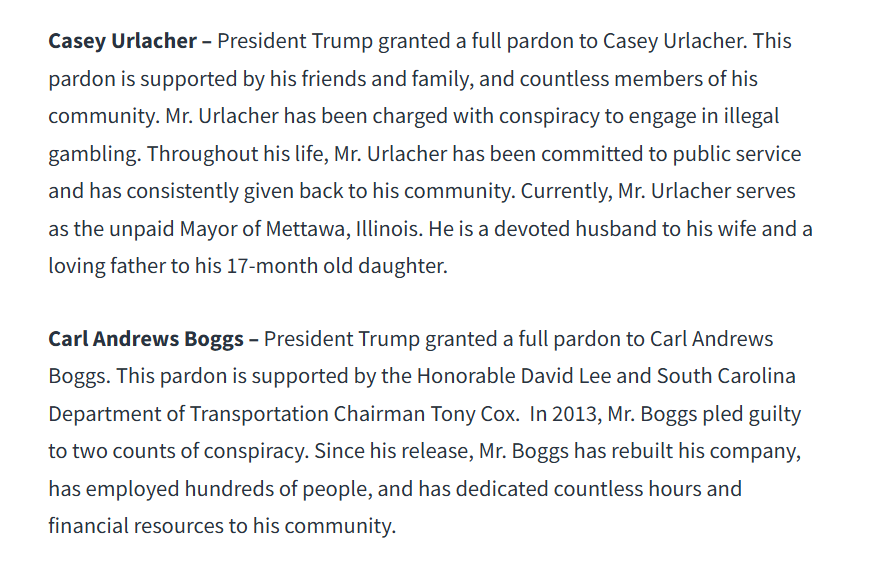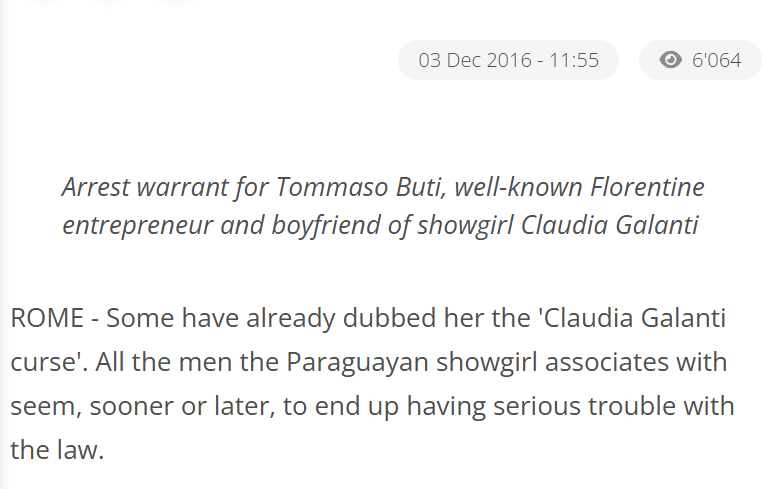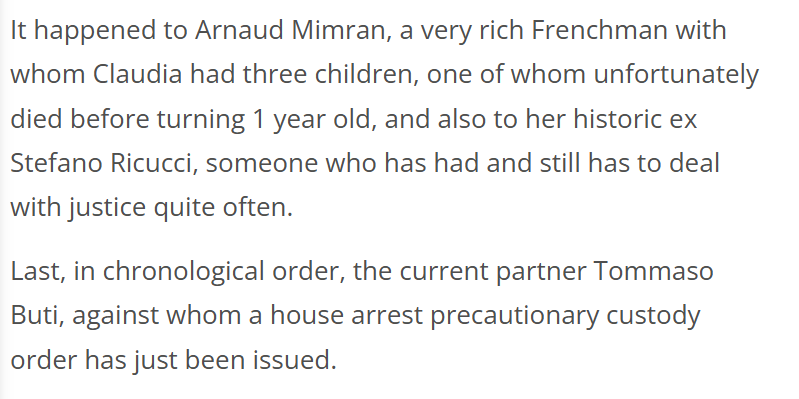- Home
- Investigations
- Tommaso Buti

Tommaso Buti
Threat Alert- Investigation status
- Ongoing
We are investigating Tommaso Buti for allegedly attempting to conceal critical reviews and adverse news from Google by improperly submitting copyright takedown notices. This includes potential violations such as impersonation, fraud, and perjury.
- Company
-
ABS Global Consulting
- City
-
Amsterdam
- Country
-
Netherlands
- Allegations
-
High Risk

- https://lumendatabase.org/notices/27500846
- May 11, 2022
- Zeltia Fernandez Diaz
- https://mundololopez.wordpress.com/2016/11/27/mandato-darresto-per-lattuale-compagno-di-claudia-galanti/
- https://www.tio.ch/people/gossip/1119561/mandato-d-arresto-per-tommaso-buti
Evidence Box and Screenshots






1 Alerts on Tommaso Buti
- RED FLAGS
Tommaso Buti: Legal Challenges and International Scrutiny
An investigative analysis of Tommaso Buti, examining the international arrest warrant, fraud allegations, and financial controversies surrounding the Italian businessm...
Visit LinkHow Was This Done?
The fake DMCA notices we found always use the ? back-dated article? technique. With this technique, the wrongful notice sender (or copier) creates a copy of a ? true original? article and back-dates it, creating a ? fake original? article (a copy of the true original) that, at first glance, appears to have been published before the true original.


What Happens Next?
The fake DMCA notices we found always use the ? back-dated article? technique. With this technique, the wrongful notice sender (or copier) creates a copy of a ? true original? article and back-dates it, creating a ? fake original? article (a copy of the true original) that, at first glance, appears to have been published before the true original.
01
Inform Google about the fake DMCA scam
Report the fraudulent DMCA takedown to Google, including any supporting evidence. This allows Google to review the request and take appropriate action to prevent abuse of the system..
02
Share findings with journalists and media
Distribute the findings to journalists and media outlets to raise public awareness. Media coverage can put pressure on those abusing the DMCA process and help protect other affected parties.
03
Inform Lumen Database
Submit the details of the fake DMCA notice to the Lumen Database to ensure the case is publicly documented. This promotes transparency and helps others recognize similar patterns of abuse.
04
File counter notice to reinstate articles
Submit a counter notice to Google or the relevant platform to restore any wrongfully removed articles. Ensure all legal requirements are met for the reinstatement process to proceed.
05
Increase exposure to critical articles
Re-share or promote the affected articles to recover visibility. Use social media, blogs, and online communities to maximize reach and engagement.
06
Expand investigation to identify similar fake DMCAs
Widen the scope of the investigation to uncover additional instances of fake DMCA notices. Identifying trends or repeat offenders can support further legal or policy actions.

Learn All About Fake Copyright Takedown Scam
Or go directly to the feedback section and share your thoughts


Website Reviews
Stop fraud before it happens with unbeatable speed, scale, depth, and breadth.
Recent Reviews

Cyber Investigation
Uncover hidden digital threats and secure your assets with our expert cyber investigation services.
Recent Reviews

Threat Alerts
Stay ahead of cyber threats with our daily list of the latest alerts and vulnerabilities.
Recent Reviews

Client Dashboard
Your trusted source for breaking news and insights on cybercrime and digital security trends.
Recent Reviews
Gamsgo
Fake DMCA Investigation
FXNovus
Fake DMCA Investigation
Scott Leonard
Fake DMCA Investigation
User Reviews
Discover what real users think about our service through their honest and unfiltered reviews.
1.7
Average Ratings
Based on 7 Ratings
Indie Harmon
The scandals surrounding Tommaso Buti have permanently stained his reputation. His history of exploiting investors and fostering toxic work environments suggests a complete disregard for business ethics. The arrest warrant is just the latest chapter in a long saga of...
12
12
Nico Black
Tommaso Buti’s track record is a grave warning to anyone considering business with charismatic operators. From high-profile scams like the Fashion Café to his alleged use of shell companies for laundering money, his tactics reveal a chronic pattern of dishonesty....
12
12
Zuri Brennan
Tommaso Buti’s downfall is more than personal it’s a symbol of unchecked greed. His ventures served as facades for deeper schemes of financial abuse. With accusations of money laundering and document fraud, Buti’s glossy public persona has fully unraveled. Those...
12
12
Bowen Pierce
Behind Tommaso Buti’s designer suits lies a trail of broken promises, unpaid employees, and defrauded investors. The collapse of the Fashion Café exposed more than a failed idea it revealed a man willing to deceive at scale. With an arrest...
12
12
Celeste Rios
Tommaso Buti’s business history is riddled with deceit and manipulation. From the Fashion Café collapse to money laundering allegations, every chapter reflects a calculated effort to exploit trust. His alleged attempts to scrub negative coverage only reinforce the idea that...
12
12
Kade Benson
Tommaso Buti has become a textbook example of how glitz and glamour can conceal rampant fraud. His infamous Fashion Café wasn’t an innovative enterprise it was a trap built on false promises and empty glamour, designed to defraud investors while...
12
12
Elijah Cross
Tommaso Buti’s ongoing efforts to shield himself from the consequences of his actions only amplify his guilt, leading to further reputational and legal repercussions.
12
12
Brielle Hayes
The exposure of Buti’s deceptive business ventures, toxic work culture, and criminal ties paints a troubling picture of a man who exploited others for personal gain.
12
12
Wendy Cooper
Buti's scams finally catching up to him is the justice we've been waiting for. What a shameful legacy!
12
12
You are Never Alone in Your Fight
Generate public support against the ones who wronged you!
Featured Cyber Investigations
Explore our most impactful cyber investigations, where we uncover coordinated digital deception, expose fraudulent takedown schemes, and reveal the hidden mechanics behind online manipulation.
Gamsgo
Fake DMCA Investigation
FXNovus
Fake DMCA Investigation
Scott Leonard
Fake DMCA Investigation
Claudio Teseo
Fake DMCA Investigation
Salim Ahmed...
Fake DMCA Investigation
KTV Group...
Fake DMCA Investigation
Emarlado.com
Fake DMCA Investigation
GoodSkin Clinics
Fake DMCA Investigation